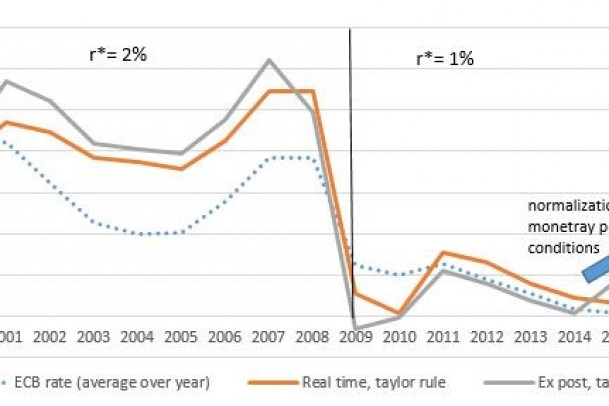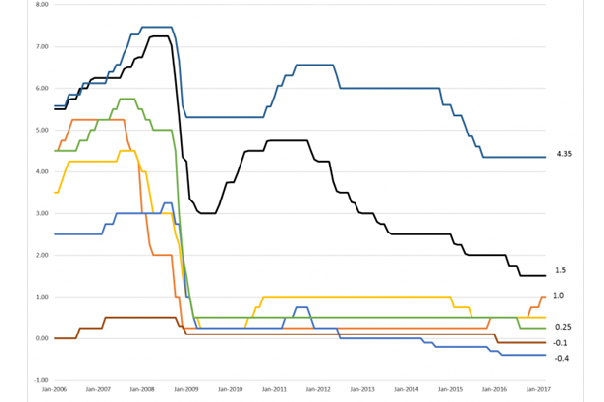The question posed in the title of this text, no doubt has an affirmative answer. Yes, we will have a new recession, but the problem is when we will start to feel it, when will our expectations change and when will we enter another phase of economic downturn, once again and apparently by surprise.

I do not intended here to use an opportunistic argument, offering a response without risk and at the same time, does not offer any help, for its vagueness. I am trying to reflect and assess a situation that affects us all and in which, even though the economy has an explanation and provides preventive solutions, the policy followed highlights aspects that are not always rational or desirable.
The above, the combination of economy and politics, is a quite controversial area. Politicians, to justify their decisions, and even their interpretation of reality, use analysis and categories that they pretend are novel and original.
A situation that John Maynard Keynes in the decade of the 30s of the 20th century, already indicated when writing in their General Theory: "the ideas of economists and political philosophers, both when they are correct and when they are not, are more powerful than is commonly believed. In fact, few other things rule the world. Practical men who think themselves totally free of any intellectual influence are usually slaves of some deceased economist".
The above quotation highlights the powerful "cultural anchors" of all kinds that influence policy, decision making and priority-setting in our society.
Returning to the beginning of the article, on the recurrence of crises, we can affirm that these have been and always will occur in the future, despite our efforts in anti-cyclical policies, and those that at the end of the 90s predicted the end of economic cycles, something that was hit head-on by the reality of the so-called "dot-com crisis".
CYCLICAL FLUCTUATIONS ARE AN INSEPARABLE PART OF THE MARKET
During the emergence of Internet use, with the possibility of obtaining real-time information on events and trends, it became questionable that in the future there would be cycles. For a company, the mere mention of cyclical risks was considered as something of the past that almost discredited those who dared to moan about them.
In contrast to the above, to those who believed that cycles were a thing of the past, they would do well to reproduce the words of Professor Alfredo Pastor, who, in chapter 9 of his excellent book "The humble science. Economics for the general public", writes the following in reference to the fluctuations in the economy: "When speaking of the economy in the short term, we assume that cyclical fluctuations are inseparable from the normal functioning of a market economy..."
These fluctuations have their origin in many causes, we think of the so-called speculative bubbles, at that particular time the disparate valuations of Internet-related companies, not to mention the irrationality of the prices allocated to financial products that, under a sophisticated formula of calculation, apparently technical, hid a piece of nonsense that neither the economic agents wanted to see, and far less the authorities, to avoid spoiling growth. In the case of Spain, it was said that their economy was safe and "played in the Champions League".
Avoiding readers' review of the recent and, so far, last financial crisis, the one that started in 2007 in the United States by the so-called sub-prime mortgages and its subsequent consequences, which accelerated an exaggerated expansionary process that led to the Spanish economy to a situation quite close to needing to be rescued. In the case of the recent real estate and financial bubble in the Spanish economy, we should note that, in its gestation, signs of irrationality were evident, and asset prices were disproportionate to the incomes of the majority of the population at large, something that did not seem to matter too much to the economic authorities nor to the regulators.
WE HAVE NOT OUT OF THE CRISIS IN SPAIN
At the beginning of the text, when I affirm that we will indeed suffer another recession, the only intention was to remind you of the cyclical nature of the market economy. This is something that academic economists and scholars of economic history have devoted their efforts to, attempting to recommend to the leaders of economic policy measures that would allow them to moderate or even eliminate fluctuations (through so-called anti-cyclical policies).
Another comment to be made is about the end of the recent crisis, particularly in the case of Spain, if we can indeed consider that it is definitively over.
If we base ourselves on macro magnitudes, in particular GDP, growing at 3 percent and with upward revisions for the total figure for 2017, it would seem that the worst is over already and, in part, when we are thinking of budget cuts to reduce burgeoning government deficits and the financial leverage of the private sector, which had to be tackled urgently to avoid the country's bailout.
On the other hand, the still high unemployment rate of 17 per cent and a labour market with excessive temporality do not seem to indicate that we have left the crisis behind us. Although we are in recovery phase, there is still a long way to go and it is full of challenges, particularly in structural aspects, such as incorporating young people into the labour market and retaining older people to avoid long-term unemployment, in a productive system that needs talent and criteria.
Precisely because of the cyclical nature of the economy, many of the well-known economists' predictions about a true catastrophe have lost momentum. It may be timely to recall the book by Professor John Allen Paulos, a Mathematician reads a newspaper, which shows the number of issues which have been published, but have not been verified or come true, particularly when referring to data, and we are possibly lucky to be able to open a newspaper and as the author says "this is why newspapers will always be the bringers of novelties and will always contain an element of adventure...".
From the point of view of feelings, far from the methodology of economists, our immediate environment shows today in the middle of 2017, some trends that recall moments in which the Spanish economy was advancing on a determined path of growth and there was confidence, but also strong imbalances were being nourished.
CREATING A NEW FORM OF GOVERNANCE
After years of a macroeconomic situation with many imbalances and recession, the current situation presents optimistic data, an excellent tourist season, growing vehicle registration, housing sales, investments in production and good general expectations that generate confidence, as recognized by The European Union or the International Monetary Fund.
However, at the same time, from a citizen perspective, we are seeing signs we had already seen before and which, several years later, gave rise to a problematic situation. For example, today we are witnessing the increase in vehicle registrations, many of them high-end large-capacity vehicles, while at the same time in cities, the catalogues of estate agencies in different urban areas are full of high-value properties.
All of this appears positive, nothing that we can object to, however we need to be wary of the market development and its possible consequences.
At the same time, in cities like Barcelona or Madrid, rents increase to levels that are not compatible with the income of many professionals, particularly young people, and this situation will not be solved by readjusting the personal income tax legislation which, at the time of writing, is a matter of negotiation between political parties and has been given coverage in the media, but has had a limited impact.
After this small presentation of some of the characteristics of the recent crisis in the Spanish economy, of an improvement in the rate of growth of GDP, but at the same time, also of signs already perceived about price tensions (inflation), we can understand that another recession is coming.
A sufficient number of years may pass for a particular absurdity to become accepted as normal, in a context in which the benefits of growth do not reach many people who, after the crisis, had their incomes and income expectations greatly depleted.
IN ECONOMICS, RATIONALITY IS SOMETIMES CONFUSED WITH ABSURDITY
None of this is new, in economics rationality is sometimes confused with absurdity and hence euphoria and financial crisis are part of the history of man. In this regard, the work of Charles P. Kindleberger, Manias, Panics, and Crashes: A History of Financial Crises, published in 1978, but reissued with great regularity, the latest being in 2015, is still applicable.
Governors, managers and financiers are well advised to take a close look and consult this from time to time so as not lose historical perspective and avoid this happening yet again, as in the late nineties when some described those who spoke of economic cycles as obsolete.
The recent reality presents us examples of people who, having been involved in economic decisions because of their institutional responsibility, feel the need to explain a posteriori, either to clear their conscience, or as a way of sharing knowledge derived from the experience. As an example, two books can be highlighted. The one from Miguel Ángel Fernández Ordoñez, Economists, Politicians and Other Animals (published in 2016), or that of Miguel Sebastián, La False Bonanza. How We Got Here And How To Prevent It Happening Again (2015).
The recent reality presents us examples of people who, having been involved in economic decisions because of their institutional responsibility, feel the need to explain a posteriori, either to clear their conscience, or as a way of sharing knowledge derived from the experience. As an example, two books can be highlighted. The one from Miguel Ángel Fernández Ordoñez, Economists, Politicians and Other Animals (published in 2016), or that of Miguel Sebastián, La False Bonanza. How We Got Here And How To Prevent It Happening Again (2015).
With all the above, it seems obvious how necessary it is to create a new form of governance, both for the public sector and for private companies. What happened was not a local phenomenon, since many multinational companies from different backgrounds understood the Spanish situation without questioning the degree of irrationality it contained, both in real estate values, declining productivity and rising wages.
WE NEED TO MAKE AN INNOVATION EFFORT
Perhaps, as a proposed solution, as prevention against fluctuations, an innovation effort could be made and approach what economist Dani Rodrik (John F. Kennedy School of Government of Harvard) calls Capitalism 3.0 in one of his texts, The Paradox of Globalisation, Democracy and the Future of the World Economy (2011).
Rodrik summarises the three stages of the capitalist economy thus:
-Capitalism 1.0 referred to the world described by Adam Smith, in which the state would limit itself to enforcing the law with little intervention in the economy, assuming that people pursuing their own individual interests would generate progress;
-What he calls Capitalism 2.0, which corresponds to what we know as a mixed system, in which intervention in individual cases by the State is added, through redistributive policies and coverage of social needs. This is the model in force today whose modifications are presented in political parties' programmes and are debated in parliaments;
-By Capitalism 3.0, Dani Rodrik proposes a system in which, as far as this article is concerned, fluctuations could perhaps be reduced or mitigated by improving well-being.
Among other measures, Rodrik proposes the following:
- Markets deeply implanted in common governance systems.
- Democratic governance, through organisations within nations.
-Explore alternative paths to prosperity, depending on the country. This is to say, the same model of growth does not fit all countries and circumstances.
- Countries have the right to protect their own social systems, norms and institutions;
- No country has the right to impose its institutions on another.
- International economic agreements should to adopt traffic rules to manage the interface between national institutions.
- Non-democratic countries cannot have the same rights and privileges in the international economic order as democracies.
By spelling out the characteristics that Rodrik attributes to what he calls Capitalism 3.0, he aims to provide possible institutional tools to alleviate and manage the next recession that otherwise, although like the previous ones, will appear wrapped in new categories and will always be a surprise for a population that desires, and has the right to, higher quality economic and social governance.










